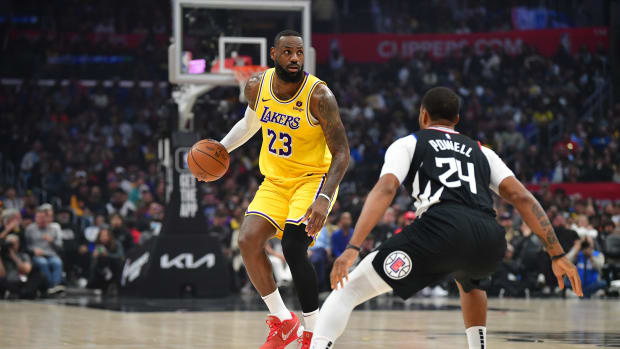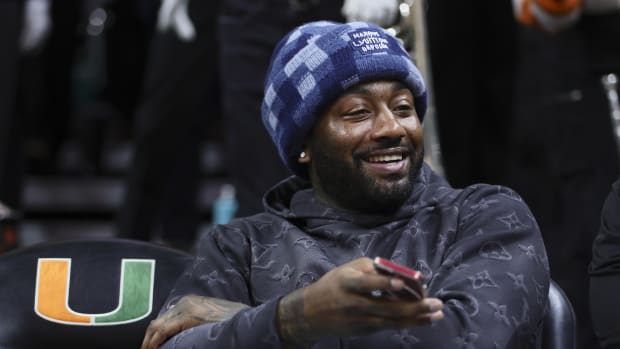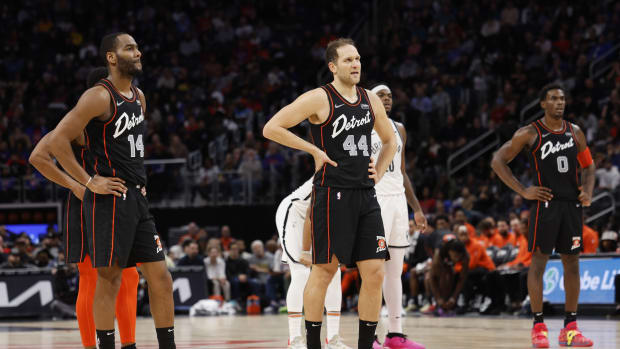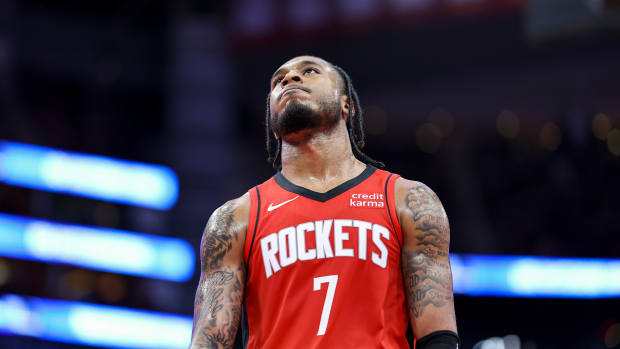The Exit Interview: Dwyane Wade on Rings, Retirement, and a Few Regrets
Sports Illustrated sat down with Heat star Dwyane Wade in Miami for The Big Interview. The full-length video feature, which covers his career from start to finish, can be seen on SI TV. In order to subscribe, click here.
Erik Spoelstra remembers the first time he was surprised by Dwyane Wade. Spo was an assistant coach with the Heat and Wade was a 6' 4" rookie guard at one of his first practices. “It was a swing pass, and he picked it off. It happened so fast—he came from the middle of the paint, stepped into the passing lane and took one dribble and dunked it,” says Spoelstra, perhaps exaggerating a bit. “Eddie Jones, Brian Grant and a few other veterans just looked around. Everybody could sense that this guy was a little bit different.”
That sense was right; the degree of just how different was way off. Now 37, Wade is one of the best two-way players in the history of the NBA, with a résumé that includes three titles, 12 straight All-Star appearances, the 2006 Finals MVP and the ’09 scoring title. His highlight reel is packed with clutch shots, headlong drives into thickets of big men and iconic performances on the NBA’s biggest stages. Never a knockdown shooter, Wade was still an accomplished scorer (career average: 22.0 points), splitting pick-and-rolls to get to his favorite spots and willing himself to the free throw line. Even when his athleticism waned and he struggled with injuries, he found ways to get buckets, becoming a lethal off-ball threat and torturing defenders with floaters, Eurosteps and bullyish post moves.
After returning to Miami late last season, he has decided to end his career this spring where it began, with his talent still very much apparent, putting up 14.4 points in 25.7 minutes per game off the bench for a team battling to get into the playoffs.
In late March on the floor at AmericanAirlines Arena—which, at the scorer’s table in 2009, he emphatically claimed as “my house”—Wade talked about his NBA life, in the shadow of the championship banners he gave his all to earn.
The Rise
Drafted with the No. 5 pick after his junior year at Marquette, Wade had a roller-coaster rookie season. Team president Pat Riley stepped down as coach after training camp and the Heat started 0–7 before making a surprise run into the second round. “Coming out of that playoffs, I was like, 'Next year is going to be something,' ” Wade says. “I didn’t know that we were going to have Shaq, but I knew that I was going to take my game to another level.”
Wade was preparing for the ESPY awards (he would be named best breakthrough athlete) when the news broke that Miami had acquired Shaquille O’Neal, then 32, from the Lakers. The trade didn’t seem real until Wade was on the red carpet, when he was introduced as “Shaquille O’Neal’s newest teammate.” Soon after, they spoke briefly by phone. Recalls Wade, “He was like, ‘This is your team. I’m just here to back you up, here to support you. I’m here to win a championship and I’m here to make you one of the best players in the world.’ And my answers were ‘O.K. Yes. O.K. O.K.’ ”
Within two seasons O’Neal had delivered on his promises. Wade was otherworldly in the 2006 Finals triumph over the Mavs, averaging 34.7 points, 7.8 rebounds and 3.8 assists while rallying Miami from an 0–2 deficit. “When he got to the playoffs, you could see he went to another level psychologically and competitively,” says Riley, who had returned to the bench midway through the season. “His quickness, his explosiveness, his getting to the free throw line, his wanton attacks on the rim, defending the other team’s best players. He never took a possession off. I played him 40 minutes a night, and he could take it.”
Wade’s Finals performance didn’t endear him to everyone. Critics—led by the Mavs’ owner, Mark Cuban, and their star forward, Dirk Nowitzki—complained that Wade got help from the refs. That’s bothered Wade for years. “It affected me,” Wade says. “It made me start saying and doing things I don’t normally do. . . . It was just a protection thing. We worked hard as hell to get that Finals. But ultimately I grew up and grew to not care, and understand that each season, each opportunity you get, they’ll all be different. You don’t care how you win it, you just care that you win it.”
Soon, the Heat’s veteran-heavy title squad was dismantled; discord between O’Neal and Riley prompted a midseason trade of Shaq in 2007–08. After winning a gold medal at the ’08 Olympics, Wade put together the two best statistical seasons of his career—on any night he could drop 30 while swatting centers’ shots for sport—but both ended in first-round flameouts. When pressed about what he would have done differently, Wade goes back to this time: “I wish I would’ve put a little bit more fire under the organization. It would’ve messed us up for 2010, but I lost some good years. If I could have had the right team around me in those years, I could be in a different category than I’m in right now.”
The Big Three
In the summer of 2010, LeBron James announced he was leaving Cleveland to sign with Miami, where he’d join fellow free-agent Chris Bosh and Wade to form a super squad. From the night the Big Three were introduced at an over-the-top rally, they experienced unprecedented levels of vitriol. “Everyone was loved individually, from what we did in high school, college, NBA, and then it all turned into ‘Aagghhh,’ ” Wade says, sounding surprised all over again. “Everywhere we went, people looked at us differently. The fans talked to us differently. We were taken aback by all the negative attention.”
Wade insists that he, James and Bosh didn’t agree to unite until 2010—and not during the ’08 Olympics in Beijing, despite what many believe: “Listen. I have no reason not to tell the truth. I never thought that I would be playing with LeBron. If you would have asked me [in ’08], ‘What’s the percentage you and LeBron play together in the NBA?’ Zero point zero. It did not happen until the summer of 2010.”
Wade says the subject first came up in a phone call that included their agents. James noted that Miami had the cap space to fit three stars, and the two players commiserated about repeatedly losing to the Celtics. Wade, James and Bosh met in person in late June and agreed to join forces, but in the days leading up to James’s announcement—the Decision—Wade hadn’t received any extra assurances from LeBron.
“I didn’t know what was going to come out of his mouth,” Wade says. “I was a little nervous. Me, him and Chris left that meeting saying this is what we’re going to do. But everybody went back to their homes, and you don’t know what’s going to change in that process. When he said, ‘take my talents to South Beach,’ I was like everybody else. I was like, ‘Yeah!’ because I knew . . . there weren’t going to be any more first-round exits for me.”
Afraid the new contracts would force the team to shed power forward Udonis Haslem, Wade re-signed for less money—and persuaded James and Bosh to leave some cash on the table as well. But the fit on the court was often awkward. Wade felt he was unequivocally the best player on the team—sharing the ball was an issue—and the public scorn was fueling the trio the wrong way. “The hatred part of it really got to us,” Wade admits. “This is what they want, this is what they’re going to get. That kind of mentality was a tough way to play basketball, with the whole weight of the world on your shoulders. So we were going to show them.”
In an email, James told SI, “We had gotten away from playing with passion and pure love of the game, so it humbled us and refocused us. It got us back to saying, ‘Let’s just have fun, let’s play for one another, let’s understand why we came together.’”
Despite the negativity, Miami finished second in the East and coasted to the Finals, only to be stunned by the Mavericks. “You never want to say it, but losing to Dallas was the best thing to happen to us,” Wade says, without a hint of regret. “Because if we won . . . oh, man. I don’t know what we would have done. We would have been so out of our minds . . . it would have been like a middle finger up to everybody. But that’s not who I am.”
The partnership between Wade and James clearly needed fine-tuning. Wade realized over the course of the season that James was actually the better player; after the Mavs’ victory, Wade knew he had to put the franchise he had built into another superstar’s hands. The conversation happened in the Bahamas, with Wade and LeBron on vacation together with their families. “It was the first time we’ve seen each other since we lost,” Wade recalls. “I remember sitting around with my wife and just thinking, What can I do next year to be better? And I knew it wasn’t what I did on the court, because I did have a hell of a year. And a hell of a Finals. So I knew it had to be something else. I watched LeBron up close. I knew he can go to a level that I couldn’t go to. And I also wanted to take a little bit of that looking-over-his-shoulder mentality away. So I said, ‘Go ahead, bro. Be your great self and we will all figure out how to be great around you.’ ”
The importance of that conversation was not lost on Spoelstra, who had been elevated to head coach following the 2007–08 season when Riley retired from coaching to focus on the front office. Now Spoelstra found himself trying to manage huge egos and even huger expectations. “How many guys are willing to do that?” he says of Wade’s gesture. “He’s emotionally stable, and has an incredible emotional intelligence. That’s when our team really took off, when LeBron was able to be the best player in the galaxy. Dwyane kicked that off.”
Says Haslem, “You don’t get Hall of Famers sharing the spotlight or stepping down. D-Wade understood the big picture, which was to be a champion.”
Scaling back was also something of a necessity. Three years older than LeBron, Wade was hampered by nagging injuries, bone bruises and the long-term effects of knee surgeries. Wringing all the utility out of his aging body, Wade provided a secondary boost as Miami won back-to-back titles. After the Heat beat the Spurs in Game 7 of the 2013 Finals, Wade memorably poured champagne on his knees, glad they had held up for at least one more night. “I didn’t know how much basketball I had left,” he says. “I remember saying, ‘I think I may be done.’ And that was after the championship. My whole mentality was, Let me try to play one more season, and if I don’t get any better, if I keep going through the same pain, I’m going to walk away from the game. It’s crazy to be 37 now and feel better than I did when I was 31 or 32.”
Wade would continue to play for the Heat—but his best friend would not. James left the Heat after the 2014 season, returning home to a younger roster in Cleveland. Wade didn’t explicitly know James’s second decision, but he could see the writing on the wall. “I know who LeBron is,” Wade says. “I know that the conversation with me was probably one of the most uncomfortable conversations that he had to have. And I know he wanted to have it earlier. We were in Vegas together, I could see there was something he wanted to say. But it was hard for him to say it. I had a feeling he was leaving. I wasn’t disappointed. I wasn’t mad.”
Says James, “He’s always been supportive of every decision I’ve ever made. Throughout my career, we’ve always bounced decisions off one another. I . . . knew, because of our friendship and the respect that we have for one another, that he would respect it. At the end of the day, there’s always been that trust and respect for each other, and that’s bigger than anything.”
Though the Big Three broke up earlier than Wade and Riley had hoped, the impact of their stunning and successful union remains. “We knew that we were changing the landscape of the NBA,” Wade says. “Everybody knows that year kind of changed the mentality of players a little bit. That’s something we are proud of, we are proud of putting the power in the players’ hands.”
The Last Dance
While Wade understood LeBron’s departure, his own was more complicated. In the summer of 2016 he was a free agent. Miami was reluctant to offer Wade—who had never been the team’s highest-paid player—a long-term deal at a high salary, hoping to save money to lure free agents. Wade told SI that summer he wanted “to be selfish for once,” and during negotiations he and Riley didn’t speak, a silence Riley has since said he regrets. Wade ultimately signed a two-year, $47 million contract with the Bulls, and would spend one year with his hometown team before a contract buyout led him back to James in Cleveland. Halfway through that season Riley and Wade mended fences at the funeral of Wade’s agent, Henry Thomas. A week later, Wade was headed back to Miami, where he was a difference-maker down the stretch and the team’s best player in its only playoff win.
After the season Wade spent a long time considering retirement. Before the start of training camp, he got a visit from Spo. “That day was really a day I wanted to be there as a friend,” says Spoelstra—though he admits that he hoped to persuade Wade to return. “For his last year, I wanted him to know there wouldn’t be any other coach who would understand him, and I didn’t want it to be any other coach. I wanted this year to be how he dreamed it.”
Wade wasn’t interested in playing “15 minutes a game and not [making] an impact. I don’t want to be the guy to sit on the bench and the fans always have to chant, ‘We want Wade.’ ” That hasn’t happened. He has hit an absurd game-winner against the Warriors, been a closer and contributed solid minutes in back-to-backs. The man whose knees looked shot has more dunks than 23-year-old forward Justise Winslow. Wade says he could play two or three more years—before insisting that he won’t. Riley notes that Wade is at the same weight, 220 pounds, he was in 2006 and that he possesses a basketball IQ that’s “off the charts.”
Riley praises Wade’s “benevolent, philanthropic approach, to come back and mentor the guys . . . . At the same time, he wants to win and compete. And he’s willing to come off the bench and do these things. There’s a lot of guys in this league who have such big egos, there’s no way they could even think of giving that away. He’s been an absolute godsend. He’s been playing like our best player.”
While Wade has competed, he’s also savored moments, like his emotional final matchup with James at Staples Center in December, or his farewell game in Chicago the next month. When they chat after practice, he puts his arm around Riley.
The last dance has been important for his old teammates too, like Bosh, whose career was cut short. He received none of the ovations—not to mention the gifts like the rocking chair from the Jazz—that Wade has gotten every night. “This never, ever happens,” Bosh says. “If he can have this opportunity to enjoy this season, to soak up everything, that’s phenomenal. It’s not a reality for everyone. It’s usually 99% of the time not a reality.”
For Wade, the farewell tour, which has seen him swap jerseys with an opponent after most games, was as much about the people around him as it was about himself: “I wanted to give [my fans] a full year, a full picture of my career. I wanted to say goodbye to everybody as much as I can, and I wanted to say thank you. I could play another year. But for me, it’s time. No one really gets to walk away from the game at the perfect time. No one’s ending is perfect. I have more left, but I don’t want to empty it all out. The passion and joy is not the same it used to be. My mind’s not 100% in it. And when it got to that point, it was time for me to walk away. I’ve given everything to this game.”





































